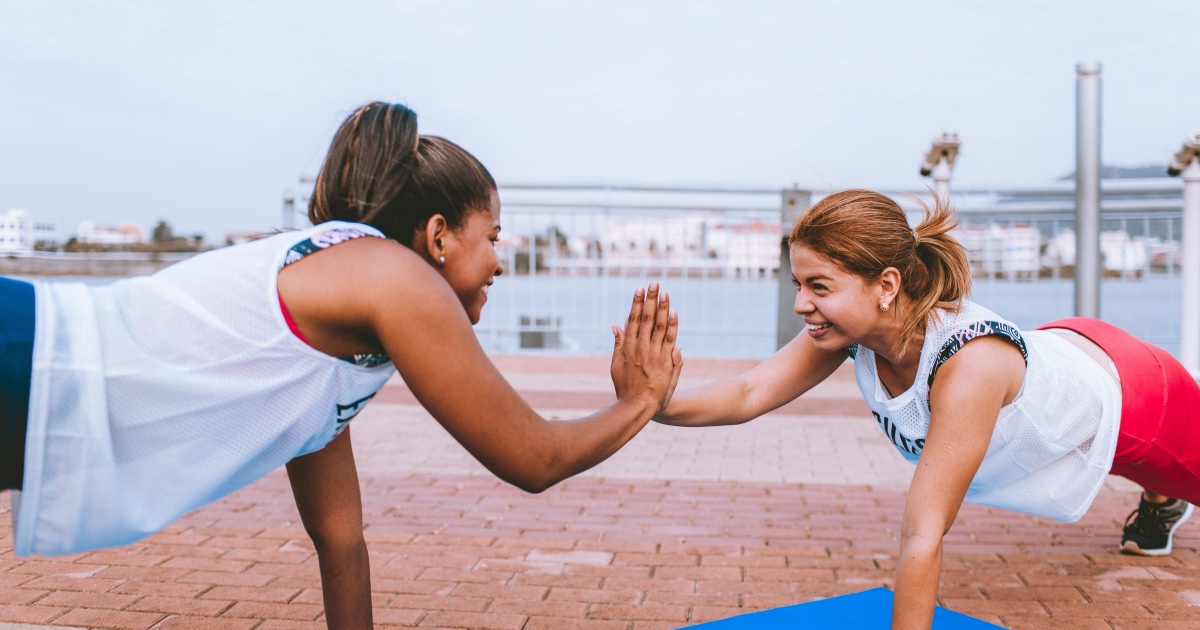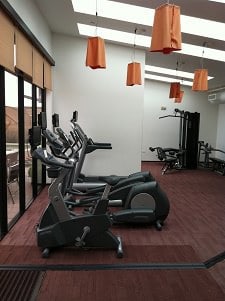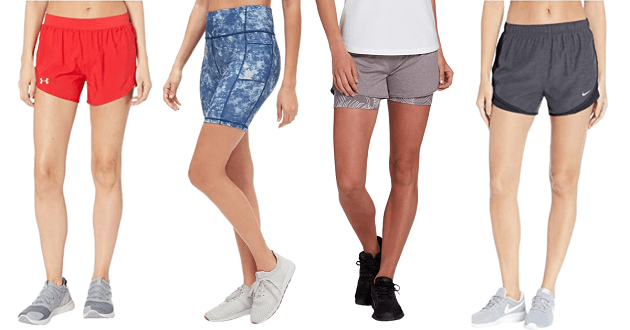This post may contain affiliate links and Corporette® may earn commissions for purchases made through links in this post. As an Amazon Associate, I earn from qualifying purchases.

2020 Update: We still stand by these 7 tips to help you hire a personal trainer, but you may also want to check out our post rounding up the best streaming workouts to do at home.
Have you ever tried to hire a personal trainer? Did you find it was a good experience, a mediocre one, or a bad one? Do you have any tips for others on how to hire a personal trainer and get the best experience possible? It’s been quite a while since we talked about finding a personal trainer, so let’s discuss it today. (We’ve also talked about lunch workouts and lifting weights, and fitting exercise into a busy day.)
You have a few options if you want to hire a personal trainer: join a gym and pick one of its staff trainers, find a trainer who works out of his or her own private space, or choose someone who’ll come to your home to work with you. But how do you find the right professional?

Finding my personal trainer (whom I’ve worked with on and off as my budget permits) was pretty easy for me — I found her through an online search and have been happy with her services — but the advice we’ll share below, which includes tips from Corporette readers, goes beyond Google:
The #1 Tip to Help You Hire a Personal Trainer: Determine Your Goals.
Do you want to train for a marathon or other event? Do you want to get healthier before trying to get pregnant? Do you want to lose weight, improve your endurance, reduce stress, feel more energetic, get stronger, or look better for your upcoming wedding or vacation?
Decide what sort of personal trainer you want.
Would you prefer someone who’s warm and chatty, or all-business? Would you like your trainer to keep you accountable by checking in with you each week about your meals and workouts or asking you to step on the scale every session? Do you want someone to design home workouts for you? Do you want nutritional advice or do you want your trainer to only focus on exercise? Does it matter to you if your trainer is a man or a woman? (There are even online-only personal trainers, such as those with Wello!)
Make a shortlist.
Assemble a list of names by asking friends, family members, and coworkers; checking reviews on Yelp; and searching by location on sites like IDEA Health & Fitness Association and The American Council on Exercise, which gave me the names of 211 and 97 trainers, respectively, within 10 miles of my zip code (in my medium-sized city). Findyourtrainer.com lets you search by location type (health club, private studio, your home), time of day, price range (from under $80 to over $120), gender, number of clients (individual, partner, or small group), and weekend or weekday. You can also fill out a simple form on the site to receive personal recommendations to help you hire a personal trainer.
Make sure the people on your list know what they’re doing.
Personal trainers can earn credentials through the American Council on Exercise (ACE), National Strength and Conditioning Association (NSCA), National Academy of Sports Medicine (NASM), American College of Sports Medicine (ACSM), and National Federation of Personal Trainers (NFPT). (Here’s a chart that breaks down this alphabet soup; it’s aimed at aspiring trainers so it goes into detail.)
Interview the candidates.
These services aren’t cheap, so you’ll want to hire a personal trainer who closely meets your requirements and who you feel comfortable with. Explain what you’re looking for and what your goals are (see above), and see if you click personality-wise. Ask any specific questions you might have — for example, how the trainer would work around a specific physical problem you’re experiencing (e.g., bad knees). Check if the trainers provide a free trial before clients commit to a package of sessions. And if they start pressuring you to buy special shakes, supplements, etc., consider it a red flag.
If you have a limited budget, get creative.
Depending on where you live, you might pay $35 to $65+ per hour for an independent personal trainer. If that sounds steep, find someone who offers group or partner training — you can save money by sharing sessions with a friend or two (and it might even be more fun). Try the YMCA or your town or city’s recreation department — or, if you belong to a gym, ask if it offers small-group strength training classes. If you’re self-motivated, hire a trainer online to design workout routines for you.
If you’re really pressed for time, let the trainers come to you.
One reader had good luck with this method, but YMMV: She placed an ad on Craigslist that explained exactly what she and her husband were looking for in a trainer. Although she could tell that many of the messages she received came from people who barely had read her ad, one stood out. She hired him and he turned out to be a great choice.
Looking for great workout shorts? See reader favorites and more in our recent roundup of the best shorts for summer…

Corporette readers shared a few location-specific recommendations, which we thought we’d pass along; bear in mind these are a few years old.
- D.C.: VIDA Fitness (Verizon Center), One to One, BodySmith
- NYC: Focus Fitness
- LA: All Out Effort
If you’ve been lucky enough to hire a personal trainer who was a good match, how did you find him or her? How has your trainer helped you reach your goals? What’s been the most helpful thing about working with someone one-on-one?
Further reading:
- How to Choose the Right Personal Trainer [American Council on Exercise]
- 5 Things to Look for in a Personal Trainer [CNN]
- How to Choose the Best Personal Trainer for You [Greatist]
- What to Look For in a Good Personal Trainer [Vitals/Lifehacker]
Originally pictured; 2020 updated images (women high-fiving while doing planks) via Stencil.

Ellen
This is an execellent p’ost. I think my Dad covered all of these pointer’s in hiring a personal trainer for MOM, b/c Grandma Leyeh said she had a fat tuchus which should be smaller.
I think the most important is to get someone with good reference’s. Mom was skittish about showing her body to just any trainer, but she now has a nice spandex outfit that she does not hesitate to wear in front of her trainer.
She has a MALE trainer, which is something I would NOT want, b/c whenever I have a trainer help me at the NYSC, it is all I can do to make him keep his hand’s away from my tuchus when he is showing me the right way to use machines.
The other important principel is to make sure the trainer is CERTIFIED. That is the ONLEY way you know he/she is not just a schlub trying to make an extra $50 by grabbing at us. FOOEY!
ConstructiveFeedback
I’ve found some of the indpendent studios near me offer “doubles” or “triples” – not quite as good as a one one one with a personal trainer, but significantly cheaper and working out with just two or three students per instructor is almost as good.
As an aside, I really hate these “__# of Ways to Do ___” bulleted list type posts that read to me more like a BuzzFeed article and less like a helpful, well researched post. I understand that they probably have a higher clickthrough rate on social media and other places, but I’m not a fan. I think you’ll also see that they tend to have lower reader engagement when judged by the number comments….
Coach Laura
I’ve only used a trainer once but found it worthwhile. It was when I used the free-to-me gym at my office and when I was there regularly, I could watch and see which trainers seemed to have what I wanted in terms of ideas, attitude. Arranged a weekly weights session with 1-2 other people and found that I got enough attention but the group made it affordable. She was able to help with diet and cardio, not just weights. I got in the best shape ever during this time and learned a lot about proper form and putting together a routine that is adaptable.
Rachel B
Ask what other classes/certifications they have, and how they incorporate those skills into training sessions. I train clients with free weights and kettle bells, pretty much exclusively. I have other certifications, but that’s really my wheelhouse. There other trainers at my gym who have martial arts or boxing backgrounds, and incorporate those areas more in their training (which is really fun, if you’ve never hit bags before). One trainer always uses TRX moves in his sessions because he wants to convert personal training clients into small-group TRX attendees.
JP
I’ve worked with a few personal trainers and I can say definitively that the most important thing is fit. Ultimately you’re going to spend a lot of time with your trainer (generally 2-4 hours a week) and you’re very vulnerable with them (transparency is key, whether it’s sharing what you’ve eaten that week or how you haven’t worked out since you last saw them) – so it should be someone you feel comfortable with. I highly recommend asking for a “test” session to see what their style is, and then make a decision from there. Also, I would shy away from any trainer that requires you to sign a long-term contract (longer than 90 days)…this generally means that they have trouble retaining clients, and there’s really no business reason for requiring such a long contract. Finally, ask what they’ll provide as part of their services – some will go out of their way to provide meal plans, will review your food journal, etc. – while some are focused only on the strengthening/exercise aspect of the job. In my experience, it’s really a holistic process, so you should try to find someone that will provide the “whole package.” I had tremendous success with most of my trainers (I’ve had 3 total, due to job relocations), and I think it’s a great option for the right situation.
Aria Wellington
I definitely agree that knowing what your goals are is really important. You can set out what experience you want to have so that whoever you hire knows just what you want. My sister and I are working on getting healthy and we have been thinking about hiring a trainer. I’m sure that these tips will help us do just that!
John Ferrell
I like the suggestion to determine your goals. I think that if you set goals then you have a reason to train. I think that if I was going to start going to the gym then I would want to have something to work for.